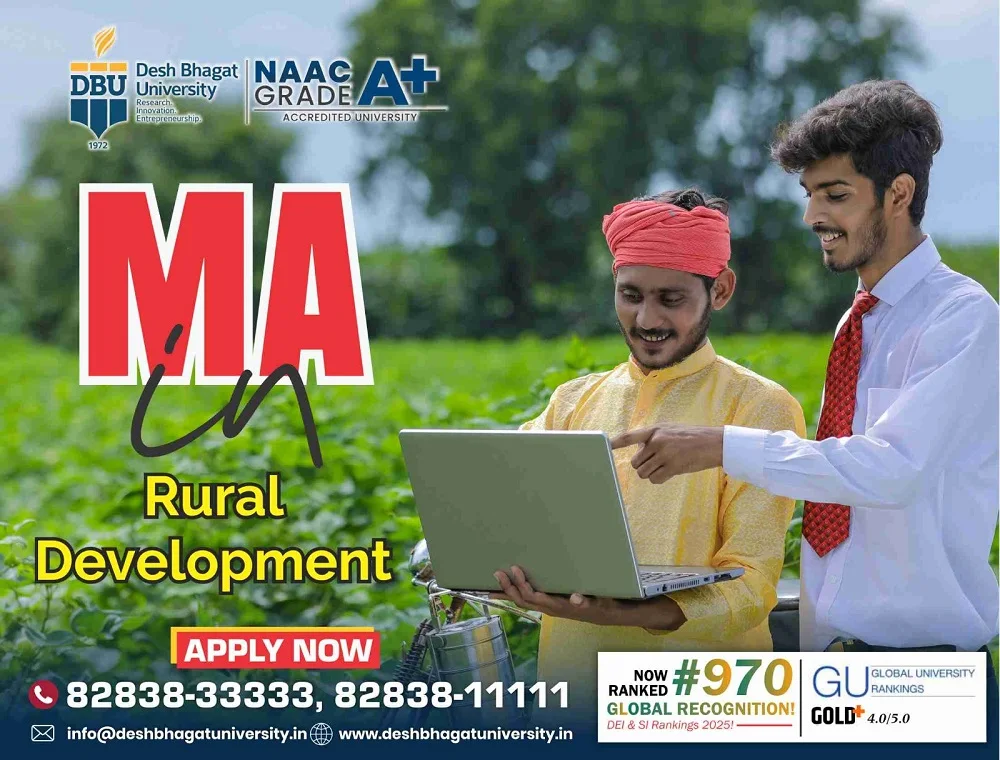MA in Rural Development: Govt Jobs, Course Details, Scope
September 29, 2025 2025-09-29 7:51MA in Rural Development: Govt Jobs, Course Details, Scope

MA in Rural Development: Govt Jobs, Course Details, Scope
The MA in Rural Development at Desh Bhagat University (DBU) is a two-year postgraduate program designed to provide students with the knowledge, skills, and understanding needed to work effectively in rural areas. This program focuses on community development, social welfare, sustainable agriculture, rural planning, and development policies. Students learn how to create positive change in rural communities, improve living conditions, and implement government schemes.
A Masters in Rural Development from DBU is ideal for those who want to work in government organizations, NGOs, research institutions, or academic institutions. The program combines theoretical knowledge with practical training to rural development challenges.
Why Study MA in Rural Development?
Studying MA in Rural Development provides students with a deep understanding of rural society and development issues. India has a large rural population, and skilled professionals are needed to plan and implement development projects. The program teaches students:
- How to assess rural problems.
- Ways to improve education, health, and infrastructure in villages.
- Techniques for implementing sustainable agriculture and environmental programs.
- How to work with government schemes for rural welfare.
Graduates gain skills that make them eligible for MA Rural Development govt jobs and roles in NGOs and research organizations.
Course Duration and Structure
The Masters in Rural Development program at DBU is two years long, divided into four semesters. Each semester is designed to gradually build knowledge and practical skills.
First 1 & 2 Semester
- Introduction to Rural Development: Basics of rural society, history of rural development, and understanding rural communities.
- Rural Sociology: Study of village life, customs, culture, and social structures.
- Rural Economics: Understanding economic issues like poverty, employment, agriculture, and income distribution in villages.
- Community Development: Methods to plan and execute projects for health, education, and livelihood improvement.
Third 3 Semester
- Rural Development Policies: In-depth study of government programs and schemes for rural areas.
- Sustainable Agriculture: Practices and policies to enhance farming productivity while preserving the environment.
- Project Planning: Designing and implementing development projects, monitoring progress, and evaluating results.
Fourth 4 Semester
- Research Project / Thesis: Students conduct original research on rural development topics. This provides hands-on experience and develops critical thinking.
- Fieldwork and Internships: Students visit villages, NGOs, and government offices to observe and participate in real development work.
This structured learning approach ensures students are well-prepared for professional work and research.
Eligibility Criteria
Students who wish to enroll in the Masters in Rural Development program must meet the following requirements:
- Educational Qualification: Graduation in any discipline from a recognized university.
- Minimum Marks: 45% for general category students; 40% for SC/ST/OBC candidates.
- Age Limit: No specific age restriction.
The program is ideal for students who are interested in rural issues, social welfare, and community development.
Admission Process
Admission to the Masters in Rural Development program at DBU is based on merit. No entrance exam is required. The process includes:
- Application Submission: Fill out the online application.
- Document Verification: Submit graduation marksheets, identity proof, and passport-size photographs.
- Selection: Based on undergraduate academic performance.
- Fee Payment: Pay the prescribed fee to confirm admission.
The admission process is simple, transparent, and designed to provide equal opportunity to eligible students.
Syllabus and Subjects
The Masters in Rural Development syllabus includes a mix of theoretical and practical subjects.
Core Subjects
- Rural Sociology: Learn about rural social structures, traditions, caste systems, and community behavior.
- Rural Economics: Study income patterns, rural employment, poverty alleviation programs, and agricultural economics.
- Community Development: Methods for improving healthcare, education, and infrastructure in villages.
- Rural Development Policies: Detailed study of government programs like MNREGA, rural health schemes, and education initiatives.
- Sustainable Agriculture: Techniques for eco-friendly and high-yield farming.
- Rural Health and Education: Addressing public health issues and improving literacy in rural areas.
Practical Exposure
- Field Visits: Students observe and participate in rural development projects.
- Internships: Work with NGOs, government offices, or development organizations.
- Research Projects: Students select topics of interest and conduct research with guidance from faculty.
Skills Gained from Masters in Rural Development
Completing a Masters in Rural Development helps students develop:
- Research and Analytical Skills: Ability to study rural problems, analyze data, and suggest solutions.
- Project Management Skills: Plan, implement, and monitor rural development programs.
- Communication Skills: Interact effectively with villagers, officials, and organizations.
- Policy Analysis: Understand and evaluate rural development policies.
- Leadership and Problem-Solving Skills: Lead community projects and address challenges creatively.
These skills make graduates eligible for Masters in Rural Development govt jobs and roles in NGOs or consultancy firms.
Career Opportunities
Graduates of MA in Rural Development from DBU can explore various careers:
Government Jobs
- Work in rural development departments and Panchayati Raj institutions.
- Join the social welfare and rural planning divisions at the state and central levels.
- Opportunities for Masters in Rural Development Govt. Jobs include district development officer, rural project manager, or planning officer.
NGOs and Nonprofits
- Work with organizations focused on education, health, and livelihood programs in rural areas.
- Engage in community-based development projects and policy implementation.
Research and Consultancy
- Conduct research on rural issues, sustainable development, and social programs.
- Provide consultancy to government and private organizations for rural projects.
Academia
- Become lecturers or faculty members in colleges and universities, teaching rural development or social science.
Graduates can also work internationally with development agencies or pursue higher studies for advanced research.
Why Choose Desh Bhagat University for MA in Rural Development?
Desh Bhagat University offers several advantages for students:
- Experienced Faculty: Learn from teachers with expertise in rural development and social welfare.
- Comprehensive Curriculum: Covers all aspects of rural development, including theory, research, and fieldwork.
- Hands-on Learning: Field visits, internships, and projects give practical experience.
- Research Opportunities: Students can conduct original research and gain analytical skills.
- Modern Facilities: Classrooms, libraries, and digital resources enhance learning.
- Supportive Environment: DBU provides mentorship and guidance throughout the program.
These advantages make DBU an ideal choice for students pursuing a Master in Rural Development.

Higher Studies after MA in Rural Development
After completing the MA in Rural Development, students can pursue:
- PhD in Rural Development: Specialize in sustainable agriculture, rural policies, or community planning.
- Diplomas and Certificates: Gain advanced knowledge in specific areas such as rural health, education, or governance.
Higher studies improve career opportunities and qualify students for research, policy-making, and teaching roles.
Conclusion
The MA in Rural Development at Desh Bhagat University is a comprehensive program that prepares students to address the challenges of rural India. With a combination of theoretical knowledge, practical exposure, and research opportunities, graduates are ready for MA Rural Development govt jobs, NGO roles, consultancy work, and academic careers.
DBU provides a supportive and resourceful environment for students to grow academically, professionally, and personally. The program equips students with the skills, confidence, and experience needed to contribute effectively to rural development and social welfare.
FAQs
1. What is MA in Rural Development?
The MA in Rural Development is a two-year postgraduate program offered by Desh Bhagat University. It focuses on rural planning, community development, social welfare, and sustainable agriculture. Students learn how to improve the living conditions of people in villages. This course prepares students for careers in government, NGOs, research, and teaching.
2. What is the duration of MA in Rural Development at DBU?
The MA in Rural Development program at Desh Bhagat University lasts two years and is divided into four semesters. Each semester covers different subjects such as rural sociology, rural economics, sustainable agriculture, and policy studies. The final semester includes research projects and fieldwork to give practical experience in rural development.
3. What are the eligibility criteria for MA in Rural Development?
To join the MA in Rural Development program at DBU, candidates must have completed a graduation in any discipline from a recognized university. General category students need a minimum of 45% marks, and SC/ST/OBC students need 40%. There is no age limit. Students with an interest in rural development are ideal for this program.
4. How can I apply for MA in Rural Development at DBU?
Admission for the MA in Rural Development at Desh Bhagat University is merit-based. Students need to fill out the online application form on the official DBU website. After submitting the necessary documents like graduation marksheets, ID proof, and photographs, candidates are selected based on academic performance. No entrance exam is required.
5. What subjects are taught in the MA in Rural Development syllabus?
The MA in Rural Development syllabus at DBU includes rural sociology, rural economics, community development, rural development policies, sustainable agriculture, rural health, and education. Students also complete practical assignments, fieldwork, and a dissertation in the final semester. This combination of theory and practice prepares students for real-life challenges in rural development.
6. What skills do students gain from MA in Rural Development?
Students pursuing MA in Rural Development develop research, analytical, and project management skills. They also improve communication skills to work with rural communities. Policy analysis, leadership, and problem-solving skills are taught through fieldwork and projects. These skills prepare graduates for careers in government, NGOs, research, and consultancy.
7. What career opportunities are available after MA in Rural Development?
Graduates of MA in Rural Development can work in government jobs, NGOs, research institutions, consultancy, and teaching. They can join rural development departments, Panchayati Raj institutions, or social welfare organizations. This degree also prepares students for MA Rural Development govt jobs, project management roles, and policy analysis positions.
8. Can I pursue higher studies after MA in Rural Development?
Yes, after completing MA in Rural Development, students can pursue a PhD in rural development or related fields. They can also take specialized diplomas or certificate courses in rural policy, community development, or sustainable agriculture. Higher studies allow students to conduct advanced research and qualify for academic or consultancy roles.
9. Why should I choose DBU for MA in Rural Development?
Desh Bhagat University provides an excellent environment for studying MA in Rural Development. It has experienced faculty, modern classrooms, libraries, and research facilities. The curriculum combines theory, research, and fieldwork. Students get practical exposure through internships and projects, making them ready for government, NGO, consultancy, and teaching careers.
10. Are there practical opportunities in the MA in Rural Development program?
Yes, the MA in Rural Development program at DBU includes practical fieldwork, internships, and research projects. Students visit villages, NGOs, and government offices to observe and participate in real rural development activities. These experiences help students understand challenges, implement solutions, and develop skills for MA Rural Development government jobs and other professional roles.






